The cybersecurity community on Reddit responded in disbelief this month when a self-described Air National Guard member with top secret security clearance began questioning the arrangement they’d made with company called DSLRoot, which was paying $250 a month to plug a pair of laptops into the Redditor’s high-speed Internet connection in the United States. This post examines the history and provenance of DSLRoot, one of the oldest “residential proxy” networks with origins in Russia and Eastern Europe.
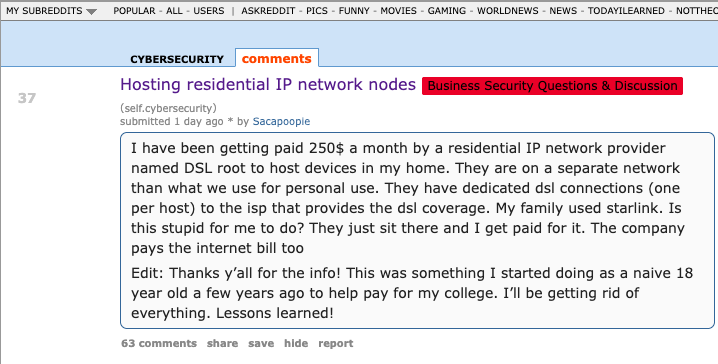
The query about DSLRoot came from a Reddit user “Sacapoopie,” who did not respond to questions. This user has since deleted the original question from their post, although some of their replies to other Reddit cybersecurity enthusiasts remain in the thread. The original post was indexed here by archive.is, and it began with a question:
“I have been getting paid 250$ a month by a residential IP network provider named DSL root to host devices in my home,” Sacapoopie wrote. “They are on a separate network than what we use for personal use. They have dedicated DSL connections (one per host) to the ISP that provides the DSL coverage. My family used Starlink. Is this stupid for me to do? They just sit there and I get paid for it. The company pays the internet bill too.”
Many Redditors said they assumed Sacapoopie’s post was a joke, and that nobody with a cybersecurity background and top-secret (TS/SCI) clearance would agree to let some shady residential proxy company introduce hardware into their network. Other readers pointed to a slew of posts from Sacapoopie in the Cybersecurity subreddit over the past two years about their work on cybersecurity for the Air National Guard.
When pressed for more details by fellow Redditors, Sacapoopie described the equipment supplied by DSLRoot as “just two laptops hardwired into a modem, which then goes to a dsl port in the wall.”

“When I open the computer, it looks like [they] have some sort of custom application that runs and spawns several cmd prompts,” the Redditor explained. “All I can infer from what I see in them is they are making connections.”
When asked how they became acquainted with DSLRoot, Sacapoopie told another user they discovered the company and reached out after viewing an advertisement on a social media platform.
“This was probably 5-6 years ago,” Sacapoopie wrote. “Since then I just communicate with a technician from that company and I help trouble shoot connectivity issues when they arise.”
Reached for comment, DSLRoot said its brand has been unfairly maligned thanks to that Reddit discussion. The unsigned email said DSLRoot is fully transparent about its goals and operations, adding that it operates under full consent from its “regional agents,” the company’s term for U.S. residents like Sacapoopie.
“As although we support honest journalism, we’re against of all kinds of ‘low rank/misleading Yellow Journalism’ done for the sake of cheap hype,” DSLRoot wrote in reply. “It’s obvious to us that whoever is doing this, is either lacking a proper understanding of the subject or doing it intentionally to gain exposure by misleading those who lack proper understanding,” DSLRoot wrote in answer to questions about the company’s intentions.
“We monitor our clients and prohibit any illegal activity associated with our residential proxies,” DSLRoot continued. “We honestly didn’t know that the guy who made the Reddit post was a military guy. Be it an African-American granny trying to pay her rent or a white kid trying to get through college, as long as they can provide an Internet line or host phones for us — we’re good.”
DSLRoot is sold as a residential proxy service on the forum BlackHatWorld under the name DSLRoot and GlobalSolutions. The company is based in the Bahamas and was formed in 2012. The service is advertised to people who are not in the United States but who want to seem like they are. DSLRoot pays people in the United States to run the company’s hardware and software — including 5G mobile devices — and in return it rents those IP addresses as dedicated proxies to customers anywhere in the world — priced at $190 per month for unrestricted access to all locations.
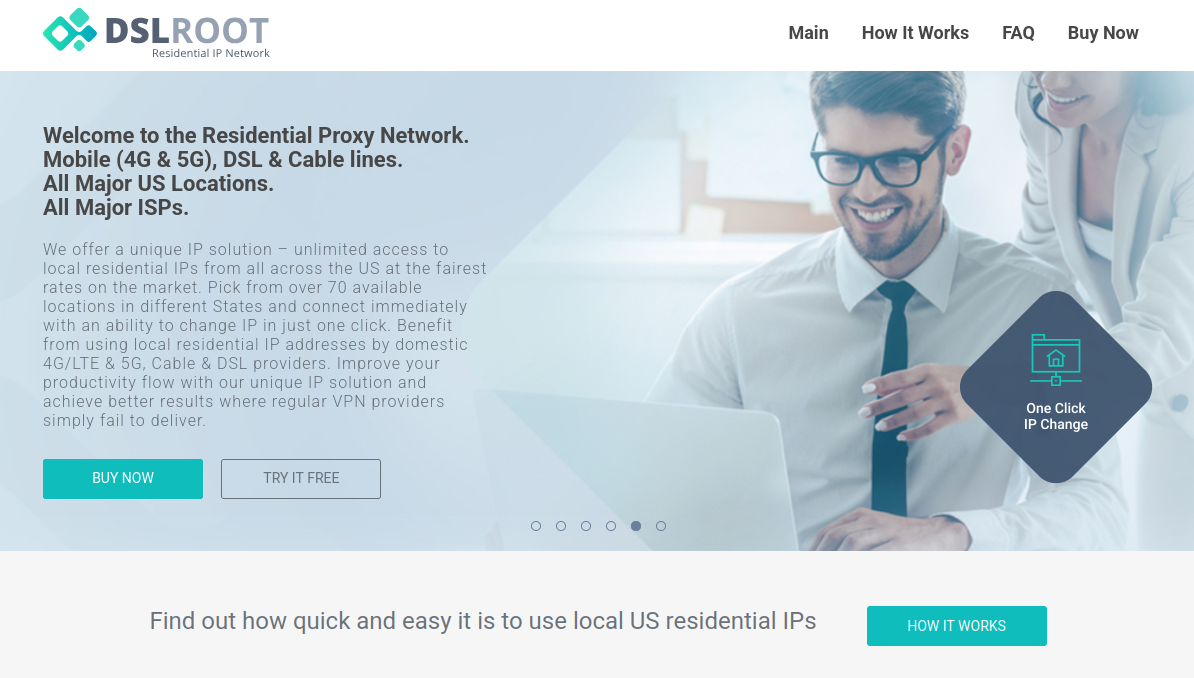
The DSLRoot website.
The GlobalSolutions account on BlackHatWorld lists a Telegram account and a WhatsApp number in Mexico. DSLRoot’s profile on the marketing agency digitalpoint.com from 2010 shows their previous username on the forum was “Incorptoday.” GlobalSolutions user accounts at bitcointalk[.]org and roclub[.]com include the email clickdesk@instantvirtualcreditcards[.]com.
Passive DNS records from DomainTools.com show instantvirtualcreditcards[.]com shared a host back then — 208.85.1.164 — with just a handful of domains, including dslroot[.]com, regacard[.]com, 4groot[.]com, residential-ip[.]com, 4gemperor[.]com, ip-teleport[.]com, proxysource[.]net and proxyrental[.]net.
Cyber intelligence firm Intel 471 finds GlobalSolutions registered on BlackHatWorld in 2016 using the email address prepaidsolutions@yahoo.com. This user shared that their birthday is March 7, 1984.
Several negative reviews about DSLRoot on the forums noted that the service was operated by a BlackHatWorld user calling himself “USProxyKing.” Indeed, Intel 471 shows this user told fellow forum members in 2013 to contact him at the Skype username “dslroot.”
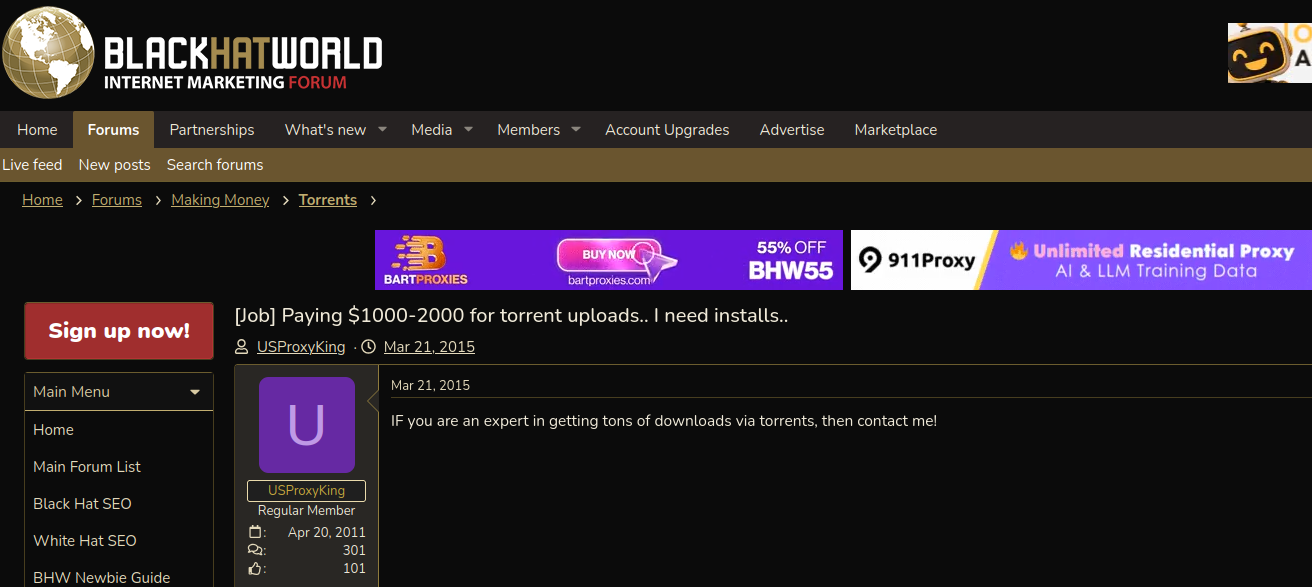
USProxyKing on BlackHatWorld, soliciting installations of his adware via torrents and file-sharing sites.
USProxyKing had a reputation for spamming the forums with ads for his residential proxy service, and he ran a “pay-per-install” program where he paid affiliates a small commission each time one of their websites resulted in the installation of his unspecified “adware” programs — presumably a program that turned host PCs into proxies. On the other end of the business, USProxyKing sold that pay-per-install access to others wishing to distribute questionable software — at $1 per installation.
Private messages indexed by Intel 471 show USProxyKing also raised money from nearly 20 different BlackHatWorld members who were promised shareholder positions in a new business that would offer robocalling services capable of placing 2,000 calls per minute.
Constella Intelligence, a platform that tracks data exposed in breaches, finds that same IP address GlobalSolutions used to register at BlackHatWorld was also used to create accounts at a handful of sites, including a GlobalSolutions user account at WebHostingTalk that supplied the email address incorptoday@gmail.com. Also registered to incorptoday@gmail.com are the domains dslbay[.]com, dslhub[.]net, localsim[.]com, rdslpro[.]com, virtualcards[.]biz/cc, and virtualvisa[.]cc.
Recall that DSLRoot’s profile on digitalpoint.com was previously named Incorptoday. DomainTools says incorptoday@gmail.com is associated with almost two dozen domains going back to 2008, including incorptoday[.]com, a website that offers to incorporate businesses in several states, including Delaware, Florida and Nevada, for prices ranging from $450 to $550.
As we can see in this archived copy of the site from 2013, IncorpToday also offered a premiere service for $750 that would allow the customer’s new company to have a retail checking account, with no questions asked.
Global Solutions is able to provide access to the U.S. banking system by offering customers prepaid cards that can be loaded with a variety of virtual payment instruments that were popular in Russian-speaking countries at the time, including WebMoney. The cards are limited to $500 balances, but non-Westerners can use them to anonymously pay for goods and services at a variety of Western companies. Cardnow[.]ru, another domain registered to incorptoday@gmail.com, demonstrates this in action.
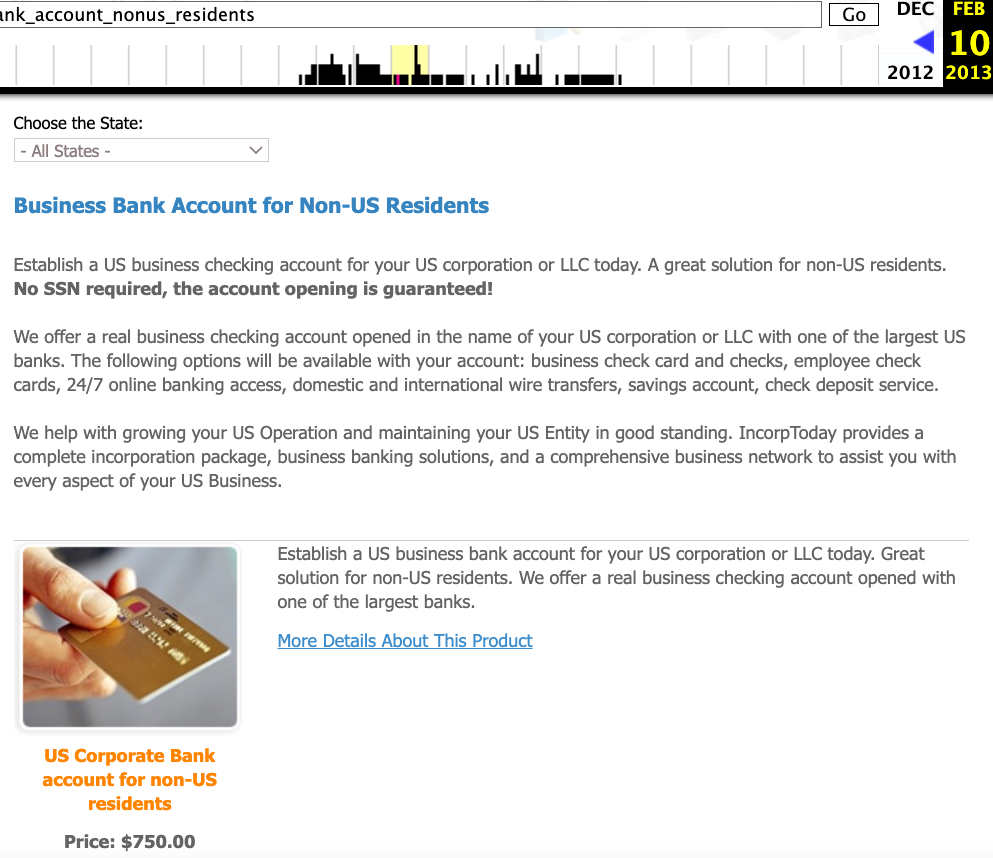
A copy of Incorptoday’s website from 2013 offers non-US residents a service to incorporate a business in Florida, Delaware or Nevada, along with a no-questions-asked checking account, for $750.
The oldest domain (2008) registered to incorptoday@gmail.com is andrei[.]me; another is called andreigolos[.]com. DomainTools says these and other domains registered to that email address include the registrant name Andrei Holas, from Huntsville, Ala.
Public records indicate Andrei Holas has lived with his brother — Aliaksandr Holas — at two different addresses in Alabama. Those records state that Andrei Holas’ birthday is in March 1984, and that his brother is slightly younger. The younger brother did not respond to a request for comment.
Andrei Holas maintained an account on the Russian social network Vkontakte under the email address ryzhik777@gmail.com, an address that shows up in numerous records hacked and leaked from Russian government entities over the past few years.
Those records indicate Andrei Holas and his brother are from Belarus and have maintained an address in Moscow for some time (that address is roughly three blocks away from the main headquarters of the Russian FSB, the successor intelligence agency to the KGB). Hacked Russian banking records show Andrei Holas’ birthday is March 7, 1984 — the same birth date listed by GlobalSolutions on BlackHatWorld.
A 2010 post by ryzhik777@gmail.com at the Russian-language forum Ulitka explains that the poster was having trouble getting his B1/B2 visa to visit his brother in the United States, even though he’d previously been approved for two separate guest visas and a student visa. It remains unclear if one, both, or neither of the Holas brothers still lives in the United States. Andrei explained in 2010 that his brother was an American citizen.
We can all wag our fingers at military personnel who should undoubtedly know better than to install Internet hardware from strangers, but in truth there is an endless supply of U.S. residents who will resell their Internet connection if it means they can make a few bucks out of it. And these days, there are plenty of residential proxy providers who will make it worth your while.
Traditionally, residential proxy networks have been constructed using malicious software that quietly turns infected systems into traffic relays that are then sold in shadowy online forums. Most often, this malware gets bundled with popular cracked software and video files that are uploaded to file-sharing networks and that secretly turn the host device into a traffic relay. In fact, USPRoxyKing bragged that he routinely achieved thousands of installs per week via this method alone.
There are a number of residential proxy networks that entice users to monetize their unused bandwidth (inviting you to violate the terms of service of your ISP in the process); others, like DSLRoot, act as a communal VPN, and by using the service you gain access to the connections of other proxies (users) by default, but you also agree to share your connection with others.
Indeed, Intel 471’s archives show the GlobalSolutions and DSLRoot accounts routinely received private messages from forum users who were college students or young people trying to make ends meet. Those messages show that many of DSLRoot’s “regional agents” often sought commissions to refer friends interested in reselling their home Internet connections (DSLRoot would offer to cover the monthly cost of the agent’s home Internet connection).
But in an era when North Korean hackers are relentlessly posing as Western IT workers by paying people to host laptop farms in the United States, letting strangers run laptops, mobile devices or any other hardware on your network seems like an awfully risky move regardless of your station in life. As several Redditors pointed out in Sacapoopie’s thread, an Arizona woman was sentenced in July 2025 to 102 months in prison for hosting a laptop farm that helped North Korean hackers secure jobs at more than 300 U.S. companies, including Fortune 500 firms.
Lloyd Davies is the founder of Infrawatch, a London-based security startup that tracks residential proxy networks. Davies said he reverse engineered the software that powers DSLRoot’s proxy service, and found it phones home to the aforementioned domain proxysource[.]net, which sells a service that promises to “get your ads live in multiple cities without getting banned, flagged or ghosted” (presumably a reference to CraigsList ads).
Davies said he found the DSLRoot installer had capabilities to remotely control residential networking equipment across multiple vendor brands.
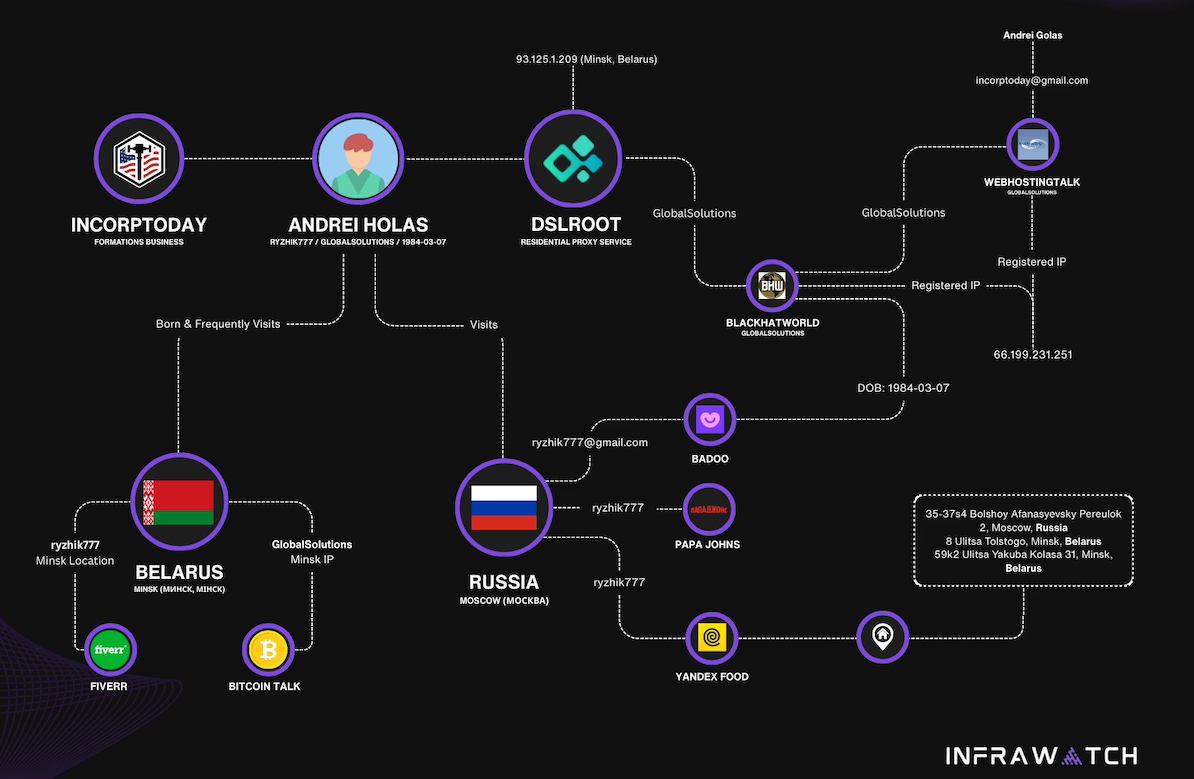
Image: Infrawatch.app.
“The software employs vendor-specific exploits and hardcoded administrative credentials, suggesting DSLRoot pre-configures equipment before deployment,” Davies wrote in an analysis published today. He said the software performs WiFi network enumeration to identify nearby wireless networks, thereby “potentially expanding targeting capabilities beyond the primary internet connection.”
It’s unclear exactly when the USProxyKing was usurped from his throne, but DSLRoot and its proxy offerings are not what they used to be. Davies said the entire DSLRoot network now has fewer than 300 nodes nationwide, mostly systems on DSL providers like CenturyLink and Frontier.
On Aug. 17, GlobalSolutions posted to BlackHatWorld saying, “We’re restructuring our business model by downgrading to ‘DSL only’ lines (no mobile or cable).” Asked via email about the changes, DSLRoot blamed the decline in his customers on the proliferation of residential proxy services.
“These days it has become almost impossible to compete in this niche as everyone is selling residential proxies and many companies want you to install a piece of software on your phone or desktop so they can resell your residential IPs on a much larger scale,” DSLRoot explained. “So-called ‘legal botnets’ as we see them.”

Most accomplished cybercriminals go out of their way to separate their real names from their hacker handles. But among certain old-school Russian hackers it is not uncommon to find major players who have done little to prevent people from figuring out who they are in real life. A case study in this phenomenon is “x999xx,” the nickname chosen by a venerated Russian hacker who specializes in providing the initial network access to various ransomware groups.
x999xx is a well-known “access broker” who frequently sells access to hacked corporate networks — usually in the form of remote access credentials — as well as compromised databases containing large amounts of personal and financial data.
In an analysis published in February 2019, cyber intelligence firm Flashpoint called x999xx one of the most senior and prolific members of the top-tier Russian-language cybercrime forum Exploit, where x999xx could be seen frequently advertising the sale of stolen databases and network credentials.
In August 2023, x999xx sold access to a company that develops software for the real estate industry. In July 2023, x999xx advertised the sale of Social Security numbers, names, and birthdays for the citizenry of an entire U.S. state (unnamed in the auction).
A month earlier, x999xx posted a sales thread for 80 databases taken from Australia’s largest retail company. “You may use this data to demand a ransom or do something different with it,” x999xx wrote on Exploit. “Unfortunately, the flaw was patched fast. [+] no one has used the data yet [+] the data hasn’t been used to send spam [+] the data is waiting for its time.”
In October 2022, x999xx sold administrative access to a U.S. healthcare provider.
The oldest account by the name x999xx appeared in 2009 on the Russian language cybercrime forum Verified, under the email address maxnm@ozersk.com. Ozersk is a city in the Chelyabinsk region of west-central Russia.
According to the breach tracking service Constella Intelligence, the address maxnm@ozersk.com was used more than a decade ago to create an account at Vktontakte (the Russian answer to Facebook) under the name Maxim Kirtsov from Ozersk. Mr. Kirtsov’s profile — “maxnm” — says his birthday is September 5, 1991.
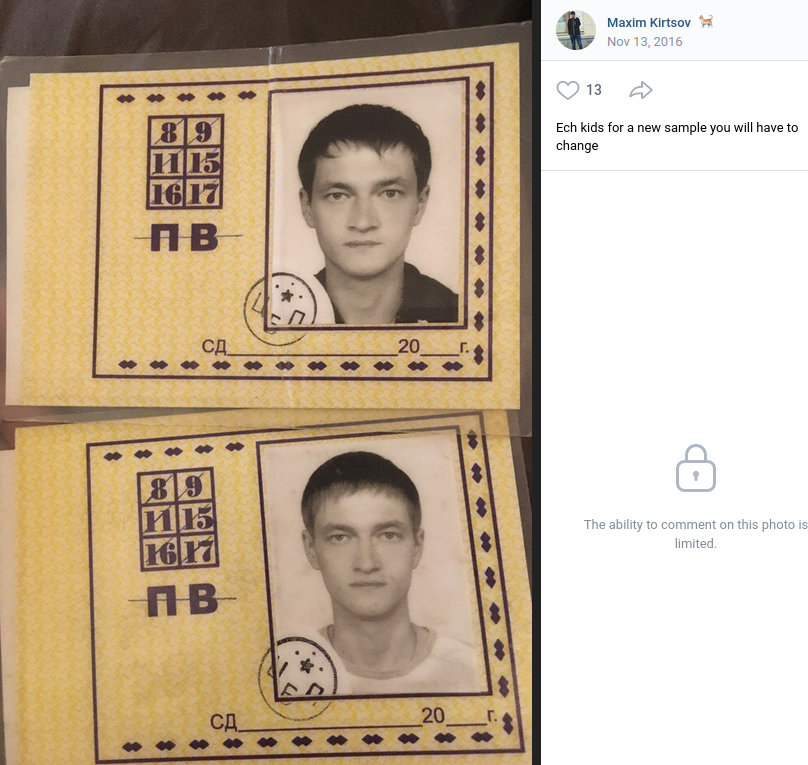
Personal photos Maxnm shared on Vktontakte in 2016. The caption has been machine translated from Russian.
The user x999xx registered on the Russian language cybercrime community Zloy in 2014 using the email address maxnmalias-1@yahoo.com. Constella says this email address was used in 2022 at the Russian shipping service cdek.ru by a Maksim Georgievich Kirtsov from Ozersk.
Additional searches on these contact details reveal that prior to 2009, x999xx favored the handle Maxnm on Russian cybercrime forums. Cyber intelligence company Intel 471 finds the user Maxnm registered on Zloy in 2006 from an Internet address in Chelyabinsk, using the email address kirtsov@telecom.ozersk.ru.
That same email address was used to create Maxnm accounts on several other crime forums, including Spamdot and Exploit in 2005 (also from Chelyabinsk), and Damagelab in 2006.
A search in Constella for the Russian version of Kirtsov’s full name — Кирцов Максим Георгиевич — brings up multiple accounts registered to maksya@icloud.com.
A review of the digital footprint for maksya@icloud.com at osint.industries reveals this address was used a decade ago to register a still-active account at imageshack.com under the name x999xx. That account features numerous screenshots of financial statements from various banks, chat logs with other hackers, and even hacked websites.
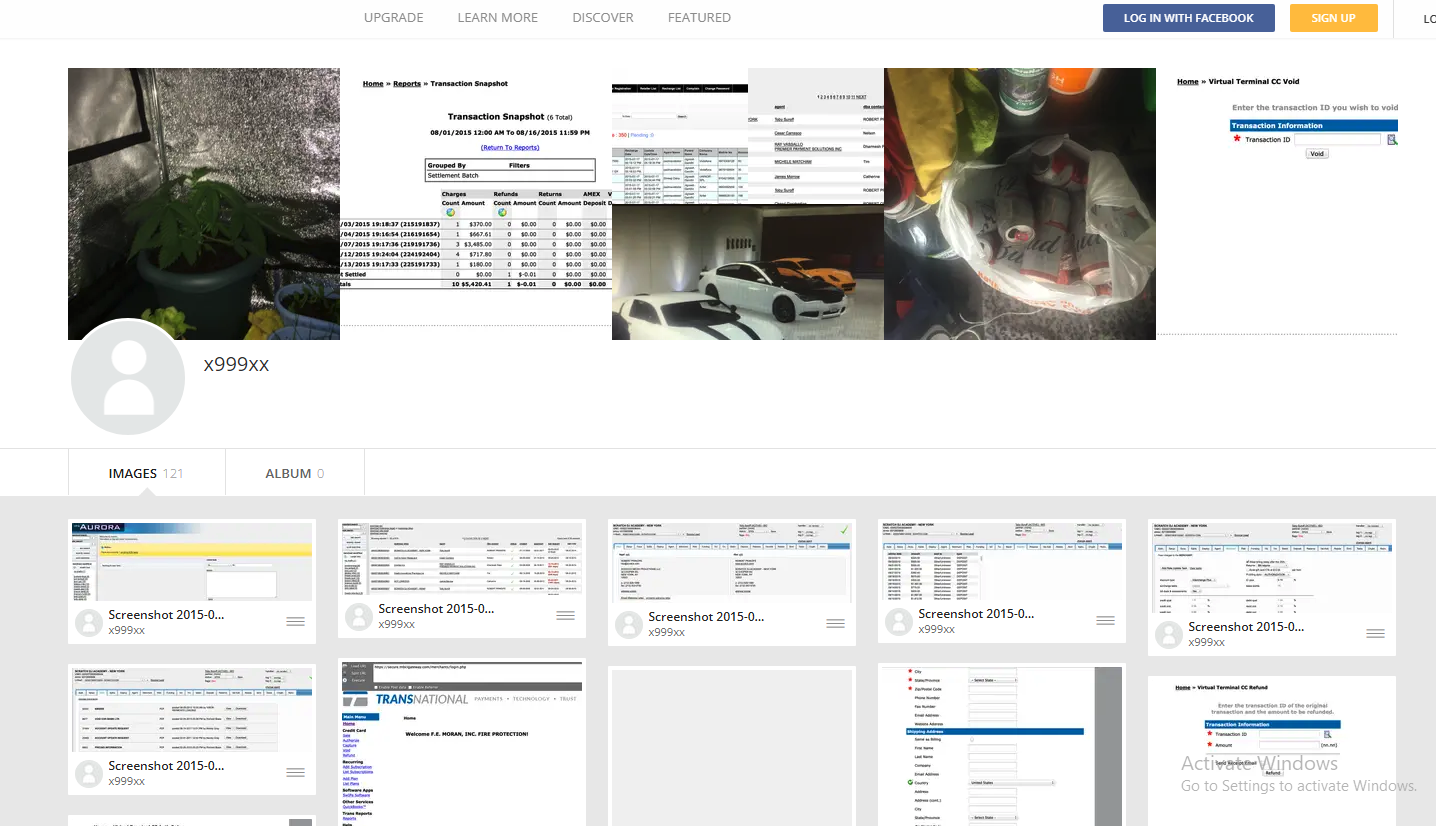
x999xx’s Imageshack account includes screenshots of bank account balances from dozens of financial institutions, as well as chat logs with other hackers and pictures of homegrown weed.
Some of the photos in that Imageshack account also appear on Kirtsov’s Vkontakte page, including images of vehicles he owns, as well as pictures of potted marijuana plants. Kirtsov’s Vkontakte profile says that in 2012 he was a faculty member of the Ozersk Technological Institute National Research Nuclear University.
The Vkontakte page lists Kirtsov’s occupation as a website called ozersk[.]today, which on the surface appears to be a blog about life in Ozersk. However, in 2019 the security firm Recorded Future published a blog post which found this domain was being used to host a malicious Cobalt Strike server.
Cobalt Strike is a commercial network penetration testing and reconnaissance tool that is sold only to vetted partners. But stolen or ill-gotten Cobalt Strike licenses are frequently abused by cybercriminal gangs to help lay the groundwork for the installation of ransomware on a victim network.
In August 2023, x999xx posted a message on Exploit saying he was interested in buying a licensed version of Cobalt Strike. A month earlier, x999xx filed a complaint on Exploit against another forum member named Cobaltforce, an apparent onetime partner whose sudden and prolonged disappearance from the community left x999xx and others in the lurch. Cobaltforce recruited people experienced in using Cobalt Strike for ransomware operations, and offered to monetize access to hacked networks for a share of the profits.
DomainTools.com finds ozersk[.]today was registered to the email address dashin2008@yahoo.com, which also was used to register roughly two dozen other domains, including x999xx[.]biz. Virtually all of those domains were registered to Maxim Kirtsov from Ozersk. Below is a mind map used to track the identities mentioned in this story.
x999xx is a prolific member of the Russian webmaster forum “Gofuckbiz,” with more than 2,000 posts over nearly a decade, according to Intel 471. In one post from 2016, x999xx asked whether anyone knew where he could buy a heat lamp that simulates sunlight, explaining that one his pet rabbits had recently perished for lack of adequate light and heat. Mr. Kirtsov’s Vkontakte page includes several pictures of caged rabbits from 2015 and earlier.
Reached via email, Mr. Kirtsov acknowledged that he is x999xx. Kirtsov said he and his team are also regular readers of KrebsOnSecurity.
“We’re glad to hear and read you,” Kirtsov replied.
Asked whether he was concerned about the legal and moral implications of his work, Kirtsov downplayed his role in ransomware intrusions, saying he was more focused on harvesting data.
“I consider myself as committed to ethical practices as you are,” Kirtsov wrote. “I have also embarked on research and am currently mentoring students. You may have noticed my activities on a forum, which I assume you know of through information gathered from public sources, possibly using the new tool you reviewed.”
“Regarding my posts about selling access, I must honestly admit, upon reviewing my own actions, I recall such mentions but believe they were never actualized,” he continued. “Many use the forum for self-serving purposes, which explains why listings of targets for sale have dwindled — they simply ceased being viable.”
Kirtsov asserted that he is not interested in harming healthcare institutions, just in stealing their data.
“As for health-related matters, I was once acquainted with affluent webmasters who would pay up to $50 for every 1000 health-themed emails,” Kirtsov said. “Therefore, I had no interest in the more sensitive data from medical institutions like X-rays, insurance numbers, or even names; I focused solely on emails. I am proficient in SQL, hence my ease with handling data like IDs and emails. And i never doing spam or something like this.”
On the Russian crime forums, x999xx said he never targets anything or anyone in Russia, and that he has little to fear from domestic law enforcement agencies provided he remains focused on foreign adversaries.
x999xx’s lackadaisical approach to personal security mirrors that of Wazawaka, another top Russian access broker who sold access to countless organizations and even operated his own ransomware affiliate programs.
“Don’t shit where you live, travel local, and don’t go abroad,” Wazawaka said of his own personal mantra. “Mother Russia will help you. Love your country, and you will always get away with everything.”
In January 2022, KrebsOnSecurity followed clues left behind by Wazawaka to identify him as 32-year-old Mikhail Matveev from Khakassia, Russia. In May 2023, the U.S. Department of Justice indicted Matveev as a key figure in several ransomware groups that collectively extorted hundreds of millions of dollars from victim organizations. The U.S. State Department is offering a $10 million reward for information leading to the capture and/or prosecution of Matveev.
Perhaps in recognition that many top ransomware criminals are largely untouchable so long as they remain in Russia, western law enforcement agencies have begun focusing more on getting inside the heads of those individuals. These so-called “psyops” are aimed at infiltrating ransomware-as-a-service operations, disrupting major cybercrime services, and decreasing trust within cybercriminal communities.
When authorities in the U.S. and U.K. announced in February 2024 that they’d infiltrated and seized the infrastructure used by the infamous LockBit ransomware gang, they borrowed the existing design of LockBit’s victim shaming website to link instead to press releases about the takedown, and included a countdown timer that was eventually replaced with the personal details of LockBit’s alleged leader.
In May 2024, law enforcement agencies in the United States and Europe announced Operation Endgame, a coordinated action against some of the most popular cybercrime platforms for delivering ransomware and data-stealing malware. The Operation Endgame website also included a countdown timer, which served to tease the release of several animated videos that mimic the same sort of flashy, short advertisements that established cybercriminals often produce to promote their services online.